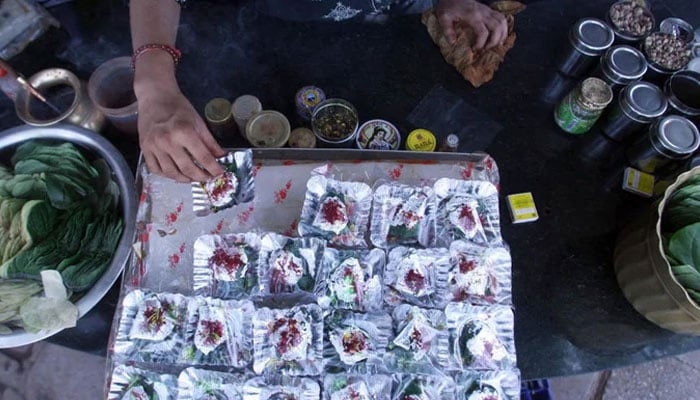Chewing tobacco, tea consumption linked to Pakistan’s oral cancer surge
Study highlights that most oral cancer patients in Pakistan are poor, uneducated men in their 50s and 60s
ISLAMABAD: Chewing tobacco products such as Niswar, Areca Nut, And Paan/Gutka are driving Pakistan’s growing oral cancer crisis, a landmark study has revealed.
The research also found a strong association between tea consumption and oral cancer, urging urgent, locally tailored interventions to address the escalating disease burden. Experts believe oral cancer has reached crisis levels in Pakistan, where it is now the second most commonly diagnosed cancer overall—and the most common among men.
Conducted across all provinces, the study highlights that most oral cancer patients in Pakistan are poor, uneducated men in their 50s and 60s, with diagnoses often made at advanced stages—placing immense pressure on the country’s already stretched healthcare system. The hospital-based case–control study, jointly carried out by researchers from Shaukat Khanum Memorial Cancer Hospital and Research Centre (SKMCH&RC) and Government College (GC) University Lahore, is the largest of its kind in the country. It underscores how cultural practices and socioeconomic conditions are fuelling a preventable cancer epidemic and calls for Pakistan-specific public health measures.
Published in the international peer-reviewed journal Global Health, Epidemiology and Genomics (Cambridge University Press), the study investigated 688 participants—277 histopathologically confirmed oral cancer patients and 411 healthy controls. It examined a wide range of factors, including demographics, lifestyle, environmental exposures, and familial traits, to identify key risk determinants associated with oral cancer in Pakistan. The findings revealed that men are significantly more likely to develop oral cancer, accounting for over 71 percent of the cases.
Most cases were presented at late stages, significantly reducing survival chances and adding to the healthcare burden. Unlike in many Western countries, where cigarette smoking and alcohol consumption are among the leading risk factors for oral cancer, the Pakistani study found chewing substances like Niswar, Areca Nut, and Paan/Gutka as the major contributors to cancer risk. Tea (chai) consumption also showed a strong link to cancer development, while coffee had a potentially protective effect. The tongue was identified as the most commonly affected site, followed by the buccal mucosa (cheek), mandible (jawbone), and lips.
Notably, patients with a family history of cancer and those born to parents from the same clan or close relatives (consanguineous unions) were also more likely to develop the disease. The study establilshed lack of physical activity appeared to increase the risk.
Dr M Usman Rashid, senior research scientist at SKMCH&RC and the principal investigator of the study, said the findings challenge conventional assumptions about oral cancer and underscore the need for culturally contextualized prevention strategies. “This study reveals that our biggest threats are not necessarily the global risk factors, but our own deeply rooted habits and practices,” he said. “We must craft public health campaigns that speak directly to our people’s realities.”
It provides an evidence-based foundation for developing oral cancer control policies, including targeted awareness campaigns, early screening programmes, and stronger regulation of Gutka, Paan Masala, and Niswar.
The researchers emphasize that unless local authorities act swiftly to incorporate these findings into national cancer control plans, the disease burden will continue to grow unchecked. “Our results offer a roadmap,” said Dr. Rashid. “It’s now up to policymakers and public health institutions to translate this data into action that can save lives.”
-
 EU Rejects Any Rise In US Tariffs After Court Ruling, Says ‘a Deal Is A Deal’
EU Rejects Any Rise In US Tariffs After Court Ruling, Says ‘a Deal Is A Deal’ -
 King Charles Congratulates Team GB Over Winter Olympics Success
King Charles Congratulates Team GB Over Winter Olympics Success -
 Meryl Streep Comeback In 'Mamma Mia 3' On The Cards? Studio Head Shares Promising Update
Meryl Streep Comeback In 'Mamma Mia 3' On The Cards? Studio Head Shares Promising Update -
 Woman Allegedly Used ChatGPT To Plan Murders Of Two Men, Police Say
Woman Allegedly Used ChatGPT To Plan Murders Of Two Men, Police Say -
 UK Seeks ‘best Possible Deal’ With US As Tariff Threat Looms
UK Seeks ‘best Possible Deal’ With US As Tariff Threat Looms -
 Andrew Arrest Fallout: Princess Beatrice, Eugenie Face Demands Over Dropping Royal Titles
Andrew Arrest Fallout: Princess Beatrice, Eugenie Face Demands Over Dropping Royal Titles -
 Rebecca Gayheart Breaks Silence After Eric Dane's Death
Rebecca Gayheart Breaks Silence After Eric Dane's Death -
 Kate Middleton 2026 BAFTA Dress Honours Queen Elizabeth Priceless Diamonds
Kate Middleton 2026 BAFTA Dress Honours Queen Elizabeth Priceless Diamonds -
 Sterling K. Brown's Wife Ryan Michelle Bathe Reveals Initial Hesitation Before Taking On New Role
Sterling K. Brown's Wife Ryan Michelle Bathe Reveals Initial Hesitation Before Taking On New Role -
 BAFTA Film Awards Winners: Complete List Of Winners
BAFTA Film Awards Winners: Complete List Of Winners -
 Millie Bobby Brown On Her Desire To Have A Big Brood With Husband Jake Bongiovi
Millie Bobby Brown On Her Desire To Have A Big Brood With Husband Jake Bongiovi -
 Backstreet Boys Admit Aging Changed Everything Before Shows
Backstreet Boys Admit Aging Changed Everything Before Shows -
 Biographer Exposes Aftermath Of Meghan Markle’s Emotional Breakdown
Biographer Exposes Aftermath Of Meghan Markle’s Emotional Breakdown -
 Ryan Coogler Makes Rare Statements About His Impact On 'Black Cinema'
Ryan Coogler Makes Rare Statements About His Impact On 'Black Cinema' -
 Rising Energy Costs Put UK Manufacturing Competitiveness At Risk, Industry Groups Warn
Rising Energy Costs Put UK Manufacturing Competitiveness At Risk, Industry Groups Warn -
 Kate Middleton Makes Glitzy Return To BAFTAs After Cancer Diagnosis
Kate Middleton Makes Glitzy Return To BAFTAs After Cancer Diagnosis




